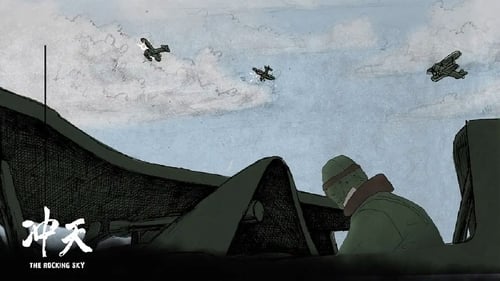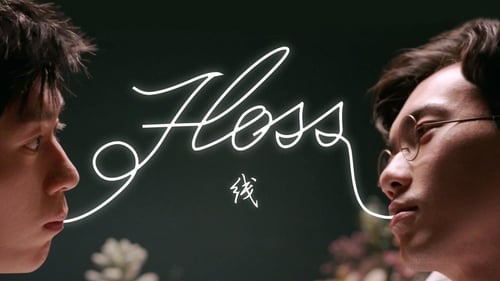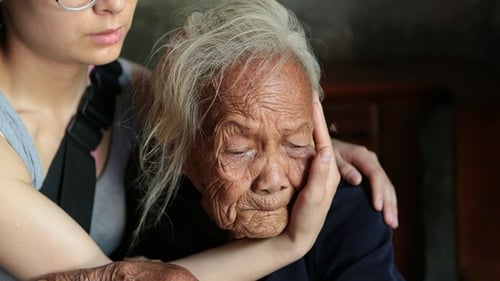
Orphan (2019)
장르 : 다큐멘터리
상영시간 : 1시간 24분
연출 : Chen Jiaping
시놉시스
Early in the morning, the priest read in the church at the disabled orphanage. At dawn, the villagers entered the funeral ceremony during the prayer ceremony. In disabled orphanages, there are babies in the youngest children. Two children attending school together did not attend the class normally. More children with reduced mobility can only be dazed and crawl on the ground. But they are also God's people and attend worship services in the church. The autumn mist was hazy, and a new cathedral was being built in the village. Insects, kittens, puppies, orphans, villagers who worship, all life is safe. At night, the tired priest went to sleep after finishing writing. In his dream, he reached a graveyard and remained silent with his dying mother. Seasons are changing, rainy days, winter snow, orphans wear thick winter clothes, making movement more difficult. The cathedral was built, and people celebrated the biggest Christmas day of the year.

A soon-to-be first-time voter, the filmmaker’s thought-provoking journey into the Rust Belt and South captures four Asian American voters’ ardent first time grassroots political participation ignited by the 2016 rise of “Chinese Americans for Trump.” FIRST VOTE is a character driven cinema verité style film chronicling the democratic participation of four Asian American voters from 2016 through the 2018 midterm elections.

The mother of a murderer awaits and prepares to meet her son. The true story of a man who killed six Shanghai policemen after suffering police beatings as a punishment for riding an unlicensed bicycle. This film was produced as a part of the Jeonju Digital Project.

마이키앙은 등대에서 일하는 30세 전후의 노총각이다. 외롭고 단조로운 생활속에 그는 꿈속에서 종종 첸킹이라는 여자를 만난다. 호텔에서 일하는 첸은 서른도 못되어 남편을 잃고 자신의 아들 과 함께 불운한 삶을 사는 여자다. 어느날 두사람은 만나게 되고 마이는 첸에게 자신과 관계를 맺을 것을 강요한다. 첸이 울자 마이는 심한 자책감을 느낀다. 호텔 지배인 모아저씨는 첸이 강간 당했다고 믿고 마이를 고소한다. 마이는 감옥에 갇히는데 나중에 첸이 강간이 아니라고 증언을 하여 마이는 석방된다. 첸은 세간의 입놀림의 표적이 되고, 그 사실을 알게된 마이는 첸을 찾아간다.

To commemorate the 70th anniversary of the victory of WWII, this documentary film describes the eight years of dauntless air-force fighting of the republic of China during the Anti-Japanese War, with only 300 combat-capable aircraft from China while Japan had over 2000.

황샤오유의 가족은 오랜기간동안 위기를 겪고 있다. 동성애자로 밝혀진 아버지와 신경질적인 어머니가 아슬아슬한 결혼생활을 유지하고 있기 때문이다. 그러나 프랑스인과 결혼 후 임신 6개월차에 접어든 황샤오유가 친정으로 돌아오며 가족의 위기가 더욱 심해지기 시작한다.

July 27th, 1976 - a day the people of Tangshan will never forget. When that fateful day ended, tens of thousands had been killed, and the lives of the survivors would be changed forever. No public official, no expert, nor anyone among the seismological personnel - regardless of what they were doing that day - should ever forget. History will always remember the twilight of that day.

At the end of the 1990s, about 40-50 million industrial workers were laid off in China, and the family population involved was hundreds of millions. He Guoping was one of them. After he was laid off, his wife opened a rental house. He became the "housekeeper" who cooks and cooks every day. His son He Huan was also raised by a playful child. Twenty years of follow-up shooting of this ordinary family, this continued "presence", the film has a time tentacle of "seeing the growth of grass". Some people say that this is a "civilian epic".

The relationship between two young men in Beijing becomes strained after one of them develops an unusual fetish.

중국 지역 일본군 ‘위안부’ 피해자 20만 명 2014년 촬영 당시 생존자 단 22명 그 22명의 할머니들이 들려주는 마지막 이야기 그리고… 2018년 8월 현재 중국에 남아 있는 ‘위안부’ 피해자는 단 6명 할머니들 대부분은 90세를 넘겨 삶의 끝자락에 서 있다.

One long tracking shot through a park in Chengdu.

Xuan is a young man working in the film industry in Beijing. To make a documentary film that he wants to present at international festivals, he decides to take advantage of the holidays of the Day of the Dead to return to Chengdu, his hometown located at the other end of the country. The documentary he is about to make is about his relationship with his own lover. He leaves for Chengdu, accompanied by another man, Bo, the cameraman of the film. The two men take the train to Chengdu where Hong, Xuan's lover, is waiting for them. From the first moment of their arrival at the station, Xuan and Bo begin to turn with their camera, Xuan having already explained to Bo what he wanted to film and that Hong would always be "playing", Bo then trusting in Xuan. But Hong is more and more opposed to this camera and the presence of Bo.

철도 위에서 3년 이상 촬영하면서 빛과 어둠, 언어와 제스처가 교차하며 변화하는 중국의 내면을 담았다. 추상회화를 연상케 하는 프레임을 통해 인간과 기계의 만남을 묘사한다. 기차의 일상과 인간을 추상적 이미지로 조형한 에세이 필름. (2015년 제16회 전주국제영화제) 리뷰 3년의 시간 동안 중국의 원근각지를 이동하는 철도의 이모저모를 편집하여 만든 에세이 다큐멘터리이다. 철로, 곤히 잠자는 사람들, 콩나물시루 같은 기차의 낭하, 좁은 통로에서 담배를 피우는 사람들은 중국 사회의 빛과 그림자를 무연히 은유한다. J. P 스니아데키 감독은 추상회화를 연상케 하는 회화적인 프레임 구성을 즐겨 사용한다. 순간순간 카메라의 존재를 드러나거나 카메라 뒤에 있는 자신을 드러내기도 한다. 육중한 철의 질감, 비곗덩어리, 핏물이 흐르는 내장 등의 오브제들을 활용하면서 그는 빈 라덴이나 카다피와 모택동을 비교하는 중국 사람들의 이야기를 슬쩍 끼워 넣음으로써 사회학과 문화인류학을 오간다. 슬금슬금 옆걸음질 치며 잠행하는 카메라는 영화의 말미에 쾌적한 상 등급 고속열차로 점핑한다. 철도, 기차의 일상, 인간을 추상적인 이미지로 조형해낸 이 에세이 필름은 사물을 응시하는 밝은 눈을 지닌 예술가의 노력에 의해 탄생했다. 2014년 「필름코멘트」가 선정한 10대 영화에 이름을 올렸다. (2015년 제16회 전주국제영화제/장병원)

In 1994, the oil-rich city of Karamay in Northwest China was the site of a horrible fire that killed nearly 300 schoolchildren. The students were performing for state officials and were told to stand by while the officials exited first. After the fire, the story was heavily censored in the Chinese state media. To this day, the families of Karamay have not been allowed to publicly mourn their children.

Working as a secretary for a legal office, Xiaofen records clients detailing the sordid aspects of their lives: divorce cases, medical malpractice suits, financial corruption and old-fashioned personal revenge. Xiaofen starts to question her own relationship with her boyfriend (Deng Gang), fresh out of prison and looking to get into trouble again with his gambling habit. While Xiaofen deals with the overwhelming social malaise surrounding her, rumors spread of a disaster at the local chemical plant, threatening to poison the entire city.

The movie follows two unfortunate secret lovers who are constantly looking for a solution to their situation. Both of them are always arguing over their relationship. One day they went to a trip out of the city, into the outskirt. They hope they can solve their problems or at least escape them temporarily. They don’t have a solution, and they don’t understand why they are together. One thing that keeps them together is their love and care for each other. This is the second part of James Lee’s Love Trilogy which takes another look at unfaithfulness or rather faithlessness.

A documentary film showing the life of Niu Hongmiao, a 20-year-old country girl who is now a prostitute in Beijing. Around the time of wheat harvesting, she goes back home to Dingxing County, Hebei Province to visit her parents.

Chinese film directed by Zhang Ming,

KJ is a biography of a HK musical genius. At the age of 11, KJ won the Best Pianist price and went to Czech to perform with a professional orchestra. Touching on subjects such as the meaning of life, God and the artistic process, the director’s 6-year-conversations with KJ reveal how a young man inspires by his music teacher, Nancy Loo and how he conflicts with his peers and parents. KJ is not about the victory of a genius, but how he learns to be a "human being".

Set in a quasi-ghost town that once thrived with oil in China's arid northwest, Yumen is a haunting, fragmented tale of hungry souls, restless youth, a wandering artist and a lonely woman, all searching for human connection among the town's crumbling landscape. One part "ruin porn", one part "ghost story”, and entirely shot on 16mm, the film brings together performance art, narrative gesture, and social realism not only to play with convention and defy genre, but also to pay homage to a disappearing life-world and a fading medium.









